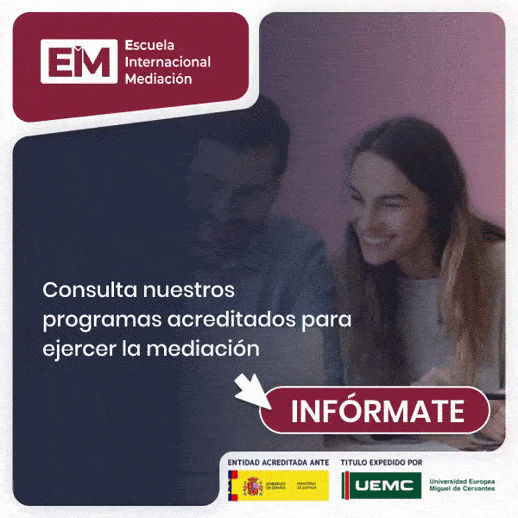Mediation
The mediation It has proven to be very useful over time in numerous cases of family breakdown, both to redirect judicialized situations and to be the method voluntarily chosen by many parents who do not want to go to court or who intend to do so only to ratify the agreed agreement. The advantages are multiple, but as long as those involved come voluntarily, want and have the capacity to participate in mediation.
But what happens in “high conflict” situations?
In this case, the families present serious problems that are difficult to resolve through mediation, being unable to respond to the situation created and therefore being ineffective when the parents are trapped in persistent and/or chronic conflict.
From mediation we find the feeling that there is a lack of adequate tools to address these situations with the limits inherent to the professional role of the mediator. On the other hand, judges, like prosecutors, observe how the executions accumulate without being able to respond with the usual resources (warnings, Family Meeting Point,...). The files become increasingly voluminous, the conflict becomes chronic and the best interests of the minor cannot be fully guaranteed.
Minors have the right to grow up in a conflict-free family environment in which their most essential rights are respected, among which the contact and stay regimes stand out, having adequate psycho-emotional, social and academic development, as well as growing up in an environment free of all abuse and/or mistreatment.
Parenting coordination
The Parenting Coordination either Parental Coordination It comes to fill this gap in the technical assistance services to the judicial system, differentiating itself not only from mediation, but also from the psychosocial teams and the technical service of the Family Meeting Point (PEF), among others.

When we talk about Parenting Coordination We talk about a process of specialized intervention, considered a expert intervention what is focused on minors and that responds to the best interests of the minor instead of the needs of the parents, as is the case of mediation. It is an intervention of mandatory compliance coming referred by the court through a judicial resolution (or exceptionally by mutual agreement of the parents), unlike mediation which is voluntary. The figure of the parental coordinator is, invested with a public function of authority by the judge once he is appointed.
The parent coordinator must swear office in court due to his expert quality. From that moment he began to develop his work as judge's assistant, having power to meet with everyone around you of the minor and professionals involved, not only with the parents, minors and their extended family, but also with teachers, counselors, paediatricians, mental health specialists, social services, PEF, etc.
Both figures, mediator and parenting coordinator, in addition to being impartial with respect to the parents, are temporary in nature, their work is determined in a specific time. However, the parent coordinator is a transversal figure which requires greater specialization and that brings together various roles. Must be highly qualified with training not only in mediation techniques, skills training and conflict management, but also have knowledge of legislation in procedural and family law, work and social intervention, child and adolescent psychology, in addition to having specific training of the function.

The mediation process is confidential. Mediators will be protected by professional secrecy, with some exceptions, as well as if it poses a threat to the life or physical or mental integrity of a person. Nor will it issue reports during or after completing the intervention. However, the Parenting Coordination it is not confidential. The parent coordinator will have a fluid communication with the judges, will issue different reports throughout the process and will be able to testify. Unlike the mediator, he also has the capacity to make recommendations and make certain decisions, as well as be able to exercise an educational function with the parents.
Therefore, When is parental coordinator intervention appropriate?
- If situations of high family conflict are detected.
- Serious conflicts occur between parents where there is hostility, distancing from a parent, verbal and/or physical disputes.
- The conflict has become chronic.
- They are multi-assisted families (social services, PEF, psychological and/or family therapies,...).
- Families are very judicialized.
- Minors are put at risk and the benefits that positive relationships bring them are destroyed.
- There is a history of family violence and/or drug abuse.
- There are minors with special needs.
- One parent has a very negative or distorted image of the other parent or when the desire to limit or exclude the children's contact with the other parent is openly expressed.
Given the family, social and judicial situation that these families present and the current saturation in the courts, it is necessary to become aware of the lack of protection of minors who are trapped in these situations.
This is why it is necessary to legislate the Parenting Coordination, this being the only truly effective alternative conflict resolution method for guarantee he best interest of the minor.



